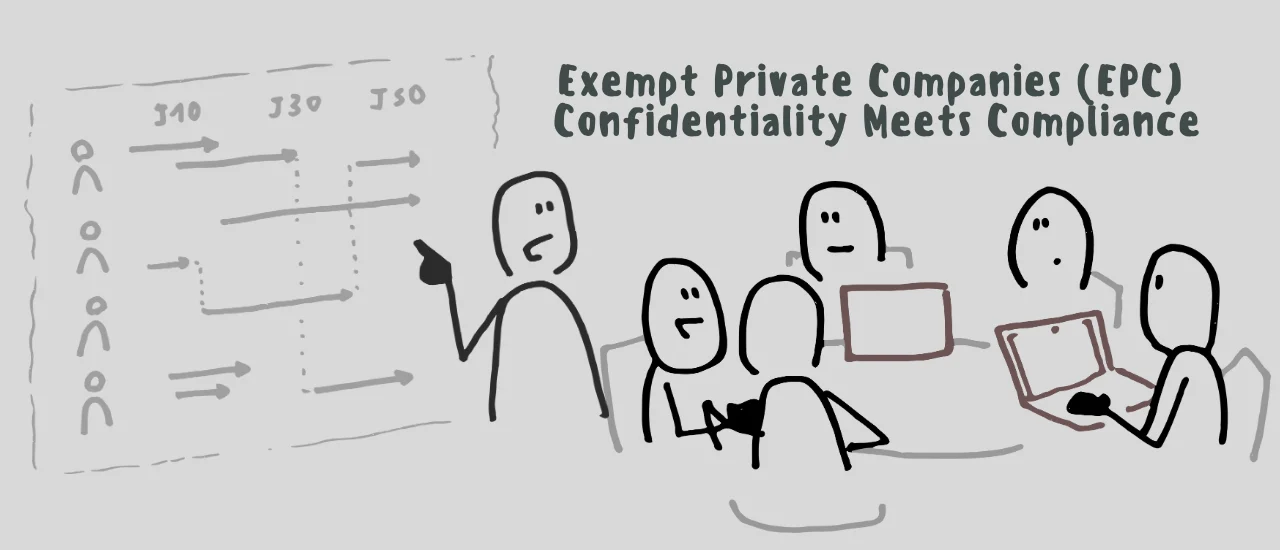
Share
When it comes to corporate structuring in Malaysia, the Exempt Private Company (EPC) is one of the most strategic yet often misunderstood structures under the Companies Act 2016. Designed to provide flexibility and reduce compliance burdens for small, closely-held businesses, EPCs are designed to balance operational efficiency with regulatory accountability
But what exactly is an EPC, why does it matter, and what are the opportunities and risks for business owners?
What is an exempt private compnay?
An Exempt Private Company (EPC) is essentially a private company where no corporation holds any beneficial interest in its shares, whether directly or indirectly. Membership is capped at 20 individuals, with none of them being a corporation. In essence, this makes EPCs the go-to structure for family-owned or owner-managed businesses that want to stay exclusive, manageable, and fully aligned with the Companies Act 2016.
Filing Requirement of an EPC
Unlike ordinary private companies that must submit full audited financial statements to the Companies Commission of Malaysia (SSM), Exempt Private Companies (EPCs) follow a different filing framework.
Under Section 260 of the Companies Act 2016, an EPC must lodge a Certificate of Status within 30 days after circulating its financial statements to members. This certificate, signed by a director, an auditor, and the company secretary, confirms three key points, that the company has always qualified as an EPC, that audited financial statements have been shared with its members, and that the company remains solvent.
Section 261 complements this by requiring the auditor to lodge an Auditor’s Statement. The statement affirms that proper accounting records have been kept, the financial statements comply with the Act, any audit qualifications are disclosed, and the company appears able to meet its liabilities.
Together, these provisions strike a balance which is EPCs may be exempted from publicly lodging their audited accounts, but shareholders still receive full audited reports, while SSM is assured of the company’s solvency and compliance.
Internal Obligation
Beyond filing, EPCs must also comply with certain internal duties under the Companies Act 2016. Section 47 requires companies to keep copies of financial statements and reports at the registered office, and to notify SSM if the location changes. This ensures accessibility of financial records for inspection. In addition, Section 257 requires directors to distribute financial statements and reports to members, auditors, and any debenture holders. Failure to comply is a serious offence, with fines of up to RM50,000.
These provisions highlight that while EPCs enjoy streamlined external compliance, internal accountability and transparency are fundamental to maintaining the company’s integrity and credibility.
Advantages of EPC
EPCs offer several key advantages for small, closely-held businesses. They provide high levels of privacy, as public lodgement of audited accounts is replaced by a Certificate of Status and an Auditor’s Statement, ensuring financial oversight without exposing sensitive information, effectively granting audit exemption for external filing purposes. EPCs carry lighter compliance burdens compared to ordinary private companies, saving both time and administrative costs. This will reduce operational expenses, making EPCs ideal for family-owned or owner-managed businesses. The structure allows greater flexibility in corporate management, with decisions made efficiently by a limited group of shareholders. Finally, EPCs maintain standard limited liability protection, safeguarding shareholders’ personal assets against business claims.
Limitation and Risks
The EPC framework offers clear advantages, but it comes with limitations that every business owner should consider. Legally, an EPC cannot have more than 20 members and is prohibited from issuing shares to corporations. This restriction makes the structure less suitable for companies that plan to expand rapidly or attract institutional investors. Reduced level of public financial disclosure, while useful for confidentiality, often raises concerns among banks and financial institutions.
Compliance risks are equally critical. Failing to lodge a Certificate of Status under Section 260 of the Companies Act 2016 can carry fines of up to RM20,000, with an additional RM1,000 for every day the offence continues. Improper accounting records under Sections 244 and 245 can result in fines of up to RM50,000, imprisonment of up to three years, or both. False declarations within the Certificate of Status carry even more severe consequences, including fines of up to RM3 million or imprisonment for up to ten years.
These strict penalties underline that while the EPC regime eases certain compliance obligations, it demands integrity and strict adherence to statutory duties.
Regulatory Development
The EPC framework continues to operate alongside evolving audit exemption policies in Malaysia. On 16 December 2024, SSM issued Practice Directive No. 10/2024, gradually expanding audit exemption thresholds for private companies between 2025 and 2027. EPCs that rely on the Certificate of Status mechanism, however, are not eligible for these exemptions and must adhere to their specific filing framework. With the rollout of MBRS 2.0 Phase 2 effective 1 March 2025, all EPC filings including Certificates of Status and Annual Returns must now be lodged digitally, further streamlining compliance and enhancing regulatory oversight.
Conclusion
The Exempt Private Company (EPC) strikes a valuable balance between privacy, flexibility, and reduced compliance for small, closely held businesses in Malaysia. By replacing the public lodgment of audited accounts with a Certificate of Status and an Auditor’s Statement, EPCs safeguard confidentiality while ensuring accountability. Directors and shareholders must remain mindful of the structure’s limitations, particularly the membership cap and the prohibition on corporate shareholding, as well as the significant penalties for non-compliance with statutory obligations.
Privacy Settings
We use cookies to improve your browsing experience, to provide personalised ads or content and to analyse our traffic. If you click on "Accept All", you agree to the use of cookies.
Cookie Usage
We use cookies to help you navigate our site smoothly and to support key functions. “Necessary” cookies are always active as they enable basic features. We also use third-party cookies to analyse usage, remember your preferences, and deliver relevant content. These cookies will only be stored with your consent. You may enable or disable them at any time, but doing so could impact your browsing experience.